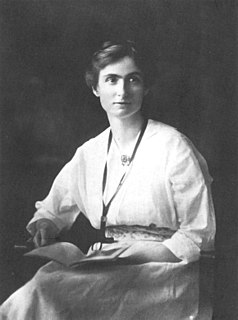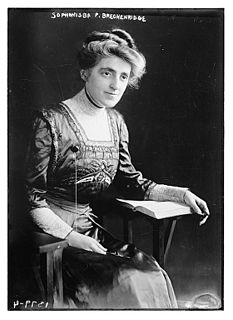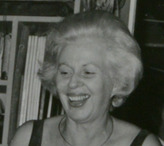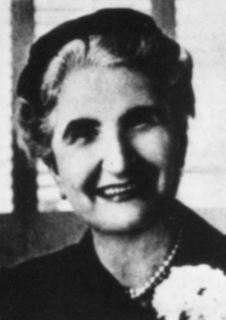Related Research Articles

Edith Abbott was an American economist, statistician, social worker, educator, and author. Abbott was born in Grand Island, Nebraska. Abbott was a pioneer in the profession of social work with an educational background in economics. She was a leading activist in social reform with the ideals that humanitarianism needed to be embedded in education. Abbott was also in charge of implementing social work studies to the graduate level. Though she was met with resistance on her work with social reform at the University of Chicago, she ultimately was successful and was elected as the school's dean in 1924, making her the first female dean in the United States. Abbott was foremost an educator and saw her work as a combination of legal studies and humanitarian work which shows in her social security legislation. She is known as an economist who pursued implementing social work at the graduate level. Her younger sister was Grace Abbott.
Social work will never become a profession—except through the professional schools

The Columbia University School of Social Work is affiliated with Columbia University as one of its graduate schools and began awarding the Master of Science (MS) degree in 1940. With an enrollment of over 900, it is one of the largest social work programs in the United States. It is also the nation's oldest, with roots extending back to 1898, when the New York Charity Organization Society's first summer course was announced in The New York Times. The combination of its age and size has led to the School becoming a repository for much of the reference literature in the social work field.

Sophonisba Preston Breckinridge was an American activist, Progressive Era social reformer, social scientist and innovator in higher education. She was the first woman to earn a Ph.D. in political science and economics then the J.D. at the University of Chicago, and she was the first woman to pass the Kentucky bar. In 1933, President Franklin D. Roosevelt sent her as a delegate to the 7th Pan-American Conference in Uruguay, making her the first woman to represent the U.S. government at an international conference. She led the process of creating the academic professional discipline and degree for social work.
Marilyn Frye is an American philosopher and radical feminist theorist. She is known for her theories on sexism, racism, oppression, and sexuality. Her writings offer discussions of feminist topics, such as: white supremacy, male privilege, and gay and lesbian marginalization. Although she approaches the issues from the perspective of justice, she is also engaged with the metaphysics, epistemology, and moral psychology of social categories.
Karl Edward Weick is an American organizational theorist who introduced the concepts of "loose coupling", "mindfulness", and "sensemaking" into organizational studies. He is the Rensis Likert Distinguished University Professor at the Ross School of Business at the University of Michigan.
Leona Elizabeth Tyler was an American psychologist and President of the American Psychological Association in 1973.
Michael Dennis Saleebey was an American academic credited with codifying and promoting the social work practice of Strength Based Practice during his time at the University of Kansas. He was Emeritus Professor of Social Welfare there at the School of Social Welfare.
Strength-based practice is a social work practice theory that emphasizes people's self-determination and strengths. It is a philosophy and a way of viewing clients as resourceful and resilient in the face of adversity. It is client-led, with a focus on future outcomes and strengths that people bring to a problem or crisis. When applied beyond the field of social work, strength-based practice is also referred to as the "strength-based approach". This approach can focus on individuals’ strengths as well as wider social and community networks.

The University of Pittsburgh School of Social Work, one of the 13 schools and colleges within the University of Pittsburgh, is located in the Oakland section of Pittsburgh, Pennsylvania. Its offices are in the world-famous Cathedral of Learning, a forty-story, Gothic style edifice that is the signature building of the university.
Bertha Capen Reynolds was an American social worker who was influential in the creation of strength-based practice, radical social work and critical social work, among others.
Gabrielle Michele Spiegel is an American historian of medieval France, and the current Krieger-Eisenhower Professor of History at The Johns Hopkins University where she served as Chair for the history department for six years and Acting and Interim Dean of Faculty. She also served as Dean of Humanities at the University of California, Los Angeles in 2004–2005, and, from 2008 to 2009, she was the President of the American Historical Association. In 2011, she was elected as a fellow to the American Academy of Arts and Sciences.

Ann C. Scales was an American lawyer, activist, and law professor at the University of Denver Sturm College of Law from 2003-2012 where she taught in constitutional law, sexual orientation and the law, civil procedure and torts.
Mary Alice Sarvis, M.D. was an American psychiatrist and psychoanalyst active in the San Francisco Bay Area in the 1940s to mid-1960s. Dr. Sarvis worked with the Oakland Police Department and Oakland Public Schools to increase understanding of and collaborate with underserved populations. Additionally, Dr. Sarvis maintained a private practice and taught at the School of Social Welfare at the University of California, Berkeley. Founded after Dr. Sarvis' unexpected death in 1965, the Mary Sarvis Memorial Fund continues the work of Dr. Sarvis by issuing small, life-improving grants to Bay Area children for targeted individual needs such as medical supplies and extracurricular activities.
Eleanor Bontecou was an American lawyer, civil rights advocate, law professor and government official. Bontecou served as an attorney and investigator for both the U.S. Department of Justice and U.S. War Department. She also worked as a professor at two universities. During her career, Bontecou achieved national fame for her work in the civil liberties and women's rights movements.
Ann E. Cudd is an American philosopher. She is Provost and Senior Vice Chancellor & Professor of Philosophy at the University of Pittsburgh. She was formerly Dean of the College and Graduate School of Arts & Sciences at Boston University. Before that, she was Vice Provost and Dean of Undergraduate Studies, as well as University Distinguished Professor of Philosophy, at the University of Kansas. She was also an affiliated faculty member in the Women, Gender, and Sexualities Studies Program during her time there. Cudd is considered one of the founders of analytical feminism, was a founding member of the Society for Analytical Feminism, and served as its president from 1995-1999.

Alma Rosalie Eikerman was an American metalsmith, silversmith, and jewelry designer who was instrumental in building the metals program at Indiana University, of which she retired Distinguished Professor Emeritus. She was a founding member of the Society of North American Goldsmiths and studied under several internationally renowned metalsmiths, such as Karl Gustav Hansen. Eikerman's work has appeared in over 200 exhibitions, including "Objects USA" at the Smithsonian Institution.

Margaret Ann Hickey was an American attorney, journalist, women's right's activist, and active member in government affairs between 1950 and 1975. She served as a prominent role model for women. She dedicated her career to serving those in need. She is most known for her roles of leadership in her service work, highlighted by her role as a chairman of the Commission on the Status of Women in 1961. She used her career as an attorney and journalist to help solve issues with poverty and women's rights.
Arlien Johnson (1894—1988) was an American social work researcher. She was the founding Director of the School of Social Work at the University of Washington from 1934 to 1939. From 1939 until 1959, she was Dean of the University of Southern California School of Social Work.
Lynne Pepall is a Canadian-American economist, academic and researcher. She is an Economics Professor and currently chairs the Department of Community Health at Tufts University.

Inabel Burns Lindsay was a social worker and the founding dean of Howard University School of Social Work.